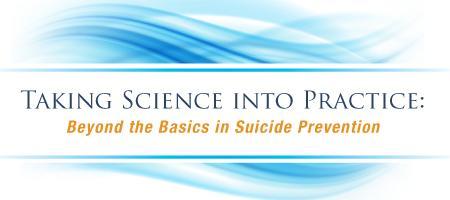Separating the Wheat from the Chaff: Identification & Triage Using the Columbia-Suicide Severity Rating Scale (C-SSRS)

Separating the Wheat from the Chaff: Identification & Triage Using the Columbia-Suicide Severity Rating Scale (C-SSRS)
Conference: 2013 Beyond the Basics in Suicide Prevention — Taking Science into Practice
Thursday, Mar 21, 2013
DoubleTree by Hilton, South Portland
Workshop/Presentation: B1: Separating the Wheat from the Chaff: Identification & Triage Using the Columbia-Suicide Severity Rating Scale (C-SSRS)
Use of the C-SSRS can improve patient safety and help relieve anxiety about not having the “right questions” to ask in identifying high risk individuals. This workshop reviewed the C-SSRS and its administration, covering its items predictive of increased risk including: severity of ideation, intensity of ideation, behaviors, and lethality of behaviors. The C-SSRS has definitions and associated probes, fostering easier and improved identification. Participants learned about how to administer the full and screening versions of the tool; how to customize the tool for various systems; and how to interpret results, streamlining triage and care delivery. Population-specific editions were reviewed (pediatric, military, etc.). System-wide implementation across multiple settings were discussed. At completion, participants were certified to administer the C-SSRS. No prior mental health training is required to administer the C-SSRS. The audiences ranged from primary care providers to peer counselors, first responders, clergy and all gatekeepers. After the workshop, participants were able to administer the C-SSRS and received a certificate.
Download Resource >
Tags: Suicide Prevention. Resource Categories: Conference Materials, Presentations, and Workshops & Trainings. Conferences: 2013 • Beyond the Basics in Suicide Prevention.
Use of the C-SSRS can improve patient safety and help relieve anxiety about not having the “right questions” to ask in identifying high risk individuals. This workshop reviewed the C-SSRS and its administration, covering its items predictive of increased risk including: severity of ideation, intensity of ideation, behaviors, and lethality of behaviors. The C-SSRS has definitions and associated probes, fostering easier and improved identification. Participants learned about how to administer the full and screening versions of the tool; how to customize the tool for various systems; and how to interpret results, streamlining triage and care delivery. Population-specific editions were reviewed (pediatric, military, etc.). System-wide implementation across multiple settings were discussed. At completion, participants were certified to administer the C-SSRS. No prior mental health training is required to administer the C-SSRS. The audiences ranged from primary care providers to peer counselors, first responders, clergy and all gatekeepers. After the workshop, participants were able to administer the C-SSRS and received a certificate.
Tags: Suicide Prevention. Resource Categories: Conference Materials, Presentations, and Workshops & Trainings. Conferences: 2013 • Beyond the Basics in Suicide Prevention.
Filter By Subject
- Anxiety (3)
- Attention Deficit Hyperactivity Disorder (3)
- Autism (2)
- Bipolar Disorder (4)
- Borderline Personality Disorder (1)
- Brain Development (2)
- Correctional Issues (25)
- Depression (5)
- Eating Disorders (2)
- Integration/Integrated Care (11)
- LGBTQ+ (6)
- ME SUD Learning Community (34)
- Medication-assisted Treatment (9)
- Mental Health (130)
- Opioids (33)
- Peer-to-Peer (31)
- Pharmacology (5)
- Recovery (28)
- Reentry (1)
- SBIRT (15)
- Self-Help (33)
- Stress (2)
- Substance Use (102)
- Suicide (6)
- Suicide Prevention (104)
- Support Groups (15)
- Technical Assistance (2)
- Tobacco (9)
- Training/Education/Handbooks (5)
- Trauma (27)
- Youth (29)
Filter By Conference
- 2017 • Summit on Opioid and Other Substance Use Disorder (1)
- 2017 • Annual Membership Meeting (13)
- 2016 • Integrating Tobacco Treatment (7)
- 2016 • HOPE Conference (11)
- 2016 • Beyond the Basics in Suicide Prevention (23)
- 2015 • DSM-X: A Look into the Future of Behavioral Health Care (5)
- 2015 • Beyond the Basics in Suicide Prevention (15)
- 2015 • Annual Membership Meeting (27)
- 2014 • Beyond the Basics in Suicide Prevention (16)
- 2014 • Annual Membership Meeting (1)
- 2013 • Rx Generation (14)
- 2013 • Beyond the Basics in Suicide Prevention (11)
- 2012 • The Assessment and Clinical Management of Suicidal Clients (13)
- 2012 • Making it Work: Implementing Seeking Safety (4)
- 2012 • Expanding Mentoring in Maine (17)
- 2012 • Beyond the Basics in Suicide Prevention (15)
- 2012 • Alternatives to Medication (25)
- 2011 • Complexities of Trauma (14)
